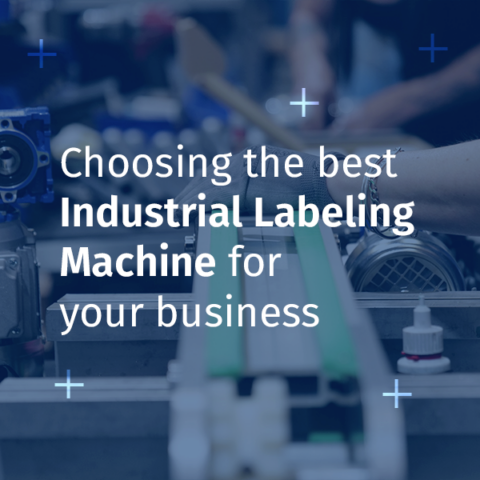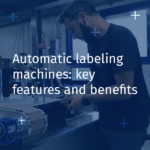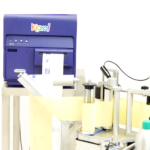For large-scale operations, choosing the right industrial labeling machine is important to ensuring efficiency, compliance, and product quality. Labeling is not just about enhancing product presentation; it also plays a vital role in traceability, regulatory compliance, and communicating essential information to consumers. Misplaced or improperly applied labels can harm brand image, lead to costly recalls, and impact overall production efficiency.
In this article, we will guide you through the different types of industrial labeling machines, the key factors to consider when choosing one, and best practices to maximize your return on investment.
Why choosing the right Labeling Machine is critical for industrial operations
Industrial labeling machines must meet specific requirements: speed, precision, and the ability to operate continuously on automated production lines. In the United States, the labeling equipment market is estimated to have a value of $2.5 billion and continues to grow due to increasing demand for compliant and large-scale labeling solutions.
The right labeling machine can not only speed up production but also reduce human error and minimize production downtime. However, choosing the right equipment depends on several criteria, such as production volume, product type, label material, and budget considerations.
Types of industrial Labeling Machines
There are several types of industrial labeling machines, each with specific applications and advantages depending on the product and the sector. Here’s an overview of the main options:
- Point Technique Labelers
3-point technique labelers apply self-adhesive labels to containers using light pressure. These machines are highly versatile and can efficiently label a wide range of containers, whether they are made of glass, plastic, or metal.
-
- Advantages:
- High precision and quick application.
- Ideal for bottles, jars, and cans.
- Easy to configure for different product formats.
-
- Limitations:
- Reduced efficiency in humid environments or at high temperatures.
- Requires specific label rolls for each format.
Examples with CDA Labelers: The CDA Ninon 1500/2500 utilizes the 3-point technique, distinguished by its ability to apply labels with great precision and speed, suitable for various formats. The SOLO is another option in this category, perfect for applications requiring maximum flexibility while ensuring high performance.
- Inline Labelers
Inline labelers use a shrink sleeve that is applied around the container and then heated to conform to the shape of the product. These machines are ideal for containers with complex shapes and provide complete label coverage, including caps.
-
- Advantages:
- Suitable for irregularly shaped products.
- Provide additional protection against counterfeiting and tampering.
- Allow for a large printing area for marketing.
-
- Limitations:
- Higher energy consumption for the shrink process.
- Higher initial cost compared to 3-point technique labelers.
Examples with CDA Labelers: The Ninon Mix and Ninon Side are inline labelers that handle various formats and types of containers, offering great flexibility for diverse production lines.
Key factors to consider when choosing an industrial Labeling Machine
- Speed and Production Volume
The machine’s speed should match the desired production volume. A slow machine can create bottlenecks and negatively affect the overall efficiency of the production line.
Example: A typical production line in the food industry can reach up to 300 units per minute. Choosing a machine capable of maintaining this pace without compromising labeling quality is crucial. - Labeling Precision and Consistency
Labeling machines should be able to position labels consistently in every cycle. Precision is particularly important for regulated products like pharmaceuticals and beverages, where any placement error can lead to compliance issues.
Key Statistic: Labeling errors account for approximately 15% of product recalls in the U.S. food industry, highlighting the importance of accurate and compliant labeling. - Compatibility with Different Product Formats
If you handle containers of varying sizes and shapes, choose a labeling machine that can be easily reconfigured to accommodate different formats. Modular machines like the Ninon Mix from CDA USA are designed to label cylindrical, square, and conical bottles on a single line, offering high flexibility for producers. - Customization and Integration Options
Modern machines should seamlessly integrate with existing production lines, including fillers, cappers, or conveyors. Opt for a labeler with customization options to meet the specific needs of your industry.
Budgeting for an industrial Labeling Machine: initial costs vs. long-term ROI
The initial investment for an industrial labeling machine can range from $20,000 to over $100,000 depending on the complexity and capabilities of the equipment. However, it’s crucial to consider long-term return on investment (ROI).
Example: A cosmetic company saved over $50,000 annually by switching from manual to automated labeling, reducing errors and waste from 15% to less than 1%. The ROI was achieved in just two years thanks to improved productivity and product quality.
Conclusion: key takeaways for choosing the best industrial Labeling Machine
To select the best industrial labeling machine, it is essential to:
- Assess Your Production Volume: Ensure the machine can keep up with your production line’s speed.
- Analyze the Types of Products Being Labeled: Choose a machine that is compatible with your container materials and label types.
- Consider Labeling Precision and Quality: Precise and consistent application is critical for compliance and brand image.
- Factor in the Budget: Evaluate the total cost of ownership, including maintenance and operational expenses.
At CDA USA, we offer a comprehensive range of industrial labeling solutions tailored to meet the needs of any business. Contact our team for personalized guidance and learn how our labeling machines can transform your production line.







